- Home
- Victor Gischler
Go-Go Girls of the Apocalypse: A Novel Page 2
Go-Go Girls of the Apocalypse: A Novel Read online
Page 2
Mortimer had maxed three credit cards stocking the cave with canned goods and medical supplies and tools and everything a man needed to live through the end of the world. There were more than a thousand books along shelves in the driest part of the cave. There used to be several boxes of pornography until Mortimer realized he’d spent nearly ten days in a row sitting in the cave masturbating. He burned the dirty magazines to keep from doing some terrible whacking injury to himself. There were also books on survival, books showing how to use the many tools he’d brought, books revealing the secrets of the land, how to skin and dress game, how to produce various medicines from plants and animals.
In the farthest reaches of the cavern, an underground stream ran through a deep chamber. Mortimer had secured a ladder down to the chamber and had rigged a system of buckets and pulleys to haul water. The cabin/cave combination was fortress, refuge, sanctuary and home. He had been relatively comfortable and safe these nine years.
Nine years. It seemed an impossible amount of time.
He dug into a cabinet and came out with a shaving mirror. He didn’t shave anymore and had put the mirror away. He took the mirror out to the cabin window so he could see himself in the light. He gasped at his reflection, the haunted eyes glaring red-rimmed from the bushy hair, and beard and eyebrows gone awry. He remembered he was now thirty-eight years old, but he looked like some old, wild hermit, streaks of gray in his black hair and beard.
Many of the books Mortimer had stashed in the cavern were novels. He’d anticipated having a lot of time on his hands. In Treasure Island, there was a character named Ben Gunn who’d been stranded on an island and had gone half insane lusting for cheese. Mortimer imagined that’s how he looked. No wonder the stranger had swung the deer rifle on him.
He fetched water up from the stream and heated it with a Coleman propane stove. He didn’t have much propane left, but he didn’t build fires in the cave because there wasn’t any way for the smoke to vent. He rummaged the storage boxes until he found a disposable razor and a can of shaving gel. Rust ringed the bottom of the can.
He splashed warm water on his face and lathered up, but the razor balked at his thick and tangled beard. He went back into the cabinet and found scissors. He cut away the beard in big patches. The hair collected around his ankles. He tried the razor again and shaved close, nicking himself around the chin. He wiped the blood with the bottom of his shirt. He cut his hair with the scissors. He surprised himself by doing a good job. Nine years had taught him patience with tedious tasks.
He went into the cabinet one more time and found the brush. He looked at it a moment like it was some alien artifact. In relearning these simple acts—shaving, brushing his hair—he was really learning to be human again. He planned to go down the mountain, and he was getting himself ready.
Mortimer brushed his hair and looked at his new sleek reflection and considered what he’d take. He would take the police special and the lever-action rifle. He wanted to protect himself but didn’t want to appear hostile and thought the Uzi might be a bit much. He’d need food and a medical kit, but he’d also need to travel light. When first outfitting his refuge, he’d flirted with the idea of a horse, but he wasn’t sure he’d be able to keep it alive. He’d sold insurance in a previous life and knew little of animal husbandry.
So he’d start down the mountain on foot. He’d go in the morning at first light with all his gear. He also decided to take three bottles of booze from the stock he’d kept unopened. Trade goods, if there was still such a thing as trade.
Trade goods. Weapons. He would not be able to get quickly back up the mountain if he needed something. He decided to pack the sled, extra weapons and the two cases of Johnnie Walker Blue, a third case of Maker’s Mark. He could hide the sled at the bottom of the mountain, retrieve whatever he needed.
He realized there would be no McDonald’s, no Holiday Inn, no Exxon station. Traveling would not be a lark. He did not know what it would be like except that it wouldn’t be the same. He could not guess what awaited him down the mountain, but it was time to find out.
He dabbed at the blood on his chin.
IV
Among Mortimer’s books were science fiction novels, some of which supposed the details of the apocalypse. Mortimer had selected these with wry irony. Popular methods whereby the world would snuff it: aliens, collisions with comets or meteors, plague, nuclear holocaust, robots rising against their masters, various natural disasters and so on and so on. Mortimer’s favorite: space bureaucrats demolishing Earth to make way for a hyperspace bypass.
No single thing had doomed Mortimer’s planet. Rather, it had been a confluence of disasters. Some dramatic and sudden, others a slow, silent decay.
The worldwide flu epidemic had come and gone with fewer deaths than predicted. Humanity emerged from that long winter and smiled nervously at one another. A sigh of relief, a bullet dodged.
That April the big one hit.
So long feared, it finally happened. The earth awoke, humped up its spine along the San Andreas. The destruction from L.A. to San Francisco defied comprehension. The earthquake sent rumbles across the Pacific, tsunamis pounding Asia. F.E.M.A. immediately declared its inadequacy and turned over operations to the military. The death toll numbered in the millions, and nothing—not food nor fuel—made it through West Coast seaports. The shortages were rapidly felt across the Midwest. Supermarkets emptied, and no trucks arrived to resupply them.
Wall Street panicked.
Nine days later a Saudi terrorist detonated a nuclear bomb in a large tote bag on the steps of the Capitol building. Both houses of Congress were in session. The president and vice president and most of the cabinet were obliterated.
The secretary of the interior was found and sworn in. This didn’t sit well with a four-star general who had other ideas. Civil war.
Economic spasms reached the European and Asian markets.
Israel dropped nukes on Cairo, Tehran and targets in Syria.
Pakistan and India went at it.
China and Russia went at it.
The world went at it.
It was pretty much all downhill from there.
V
Mortimer Tate started down the mountain, a rope over each shoulder as he pulled the sled behind him, another army surplus tote over his shoulder, police special in the pocket of his parka like usual. He carried the lever-action Winchester across his body. His pace was steady, and he puffed steam and his naked face went pink in the cold.
The base of the mountain sprawled across a high pocket wilderness that had been a state refuge. If he kept going down, Mortimer anticipated crossing one of the old hiking trails. If they hadn’t all grown over.
The slope eased, the descent becoming more gradual by midday. Mortimer paused, leaned against a tree and took water, ate jerky. He turned his head slowly, listening to the forest. Not a bird nor a whisper of wind. He was still within the limits of what he considered his own territory, but the simple knowledge he’d be going farther made the forest appear alien to him.
He rested five more minutes, then began hiking again.
By nightfall he had still not crossed one of the hiking trails. He spun in the waning light, tried to get his bearings. Had he veered in the wrong direction, or was the distance simply farther than he remembered? In the morning, he’d look again with better light.
He considered a small fire but was afraid it would be seen. He pitched a low, sleek one-man tent made of light synthetic material, crawled inside and wrapped himself in a blanket. He fell asleep almost instantly.
He dreamt he was trapped in the tent, flickering light casting hellish shadows on the thin material, the sounds of stomping feet all around. He tried to stand and run, still wrapped in the tent like a burial shroud, faceless assailants circling him. Tangled in the tent material, unable to reach the police special, hands grabbing him, lifting and twisting and bearing him away.
Mortimer awoke with a gasp, freezing, hair sweat-
soaked. He crawled out of the tent, stiff, aches in every joint. He had not slept on the ground in a long time, the thin blanket under him offering little comfort.
He squinted, looked around. Color had been bleached from the world, the sky a uniform gray. Even the evergreens were stark black against the white snow in the weak morning light, making the land appear like a two-dimensional charcoal sketch. He packed up the tent and built a fire, didn’t care if anyone saw the smoke. He needed to thaw the ache from his bones. He heated water and made a cup of tea.
When the light grew strong enough to distinguish individual pine needles, he began the day’s hike.
An hour later he crossed the first hiking trail and followed its winding path to the entrance of the refuge. There was still a brown sign with yellow lettering guarding the entrance: NATIONAL POCKET WILDERNESS.
He parked the sled behind a stand of trees, covered it with pine branches. He put a whiskey bottle in his knapsack. He’d put it in bubble wrap to keep it safe.
A hundred more steps and he stood on paved road.
He stood there awhile. An unfortunate sentimental streak rose up in Mortimer and he considered the road with misty eyes. Here was the asphalt thread that wound its way down the mountain to civilization. Or, at least, where civilization had stood once upon a time.
Mortimer rubbed his hands together, stamped his feet in the cold and considered his options. If he recalled correctly, the road ran down one side of the mountain to Evansville and the other way to Spring City. His first urge was toward Spring City, where he’d lived before with his wife, where he’d sold insurance and gone to the Methodist church every third or fourth Sunday. He couldn’t decide if he was afraid to find his wife or if he’d be disappointed if he failed to find her.
He’d left her. Abandoned her. His wife. Whatever their problems might have been, Anne was still Mortimer Tate’s wife. And a man doesn’t shirk that kind of responsibility and not feel it in his gut.
He turned and headed toward Evansville.
He felt strangely happy and expectant. He longed to see buildings, a town, and most of all people. But his heart sank at the thought of the three hunters he’d killed. Mortimer put his head down and hiked into the wind.
He paused at the first house, stood a long time hoping for someone to come out. The dark windows without curtains looked like the wide eyes of a corpse. All quiet. The same thing with the next five houses he passed, and the sixth was hollow and blackened from fire. No people.
When he reached the Luminary Firehouse, another memory surfaced. The first Monday night of every month, the firefighters had put on a spaghetti dinner fund-raiser. It had all seemed very down-home and Americana when he and Anne had come up the mountain a few times to strap on the feedbag.
Now the idea of hot pasta and meatballs and garlic bread dripping butter almost gave Mortimer an erection. He found himself unconsciously walking toward the firehouse, the memory of fat men in denim overalls slurping spaghetti drawing him on.
He stopped short, blinked at the pale face in the window. It didn’t move, wide eyes unblinking, and for a moment, Mortimer mistook it for a face on a poster, maybe an ad for Pepsi Cola or Life Savers. It was immobile, so pale and lifeless. But then a hand appeared, a wan wave.
Mortimer felt something tighten and then flutter in his chest. This time he’d do it right. No accidental murders as with the three hunters up the mountain. He slung the rifle over his shoulder, held his hands palms-up and away from his body. “Hello.”
The face withdrew into the shadow.
“Wait!”
Mortimer fast-walked toward the firehouse, the small side door next to the closed garage. He turned the knob, entered slowly. “Hello? It’s okay. I just want to talk.” He pushed the door open all the way, the sliver of sunlight widening into a brilliant yellow cone, spotlighting the young girl backed into the corner of what must have been the firehouse office. “It’s okay,” he said again.
He looked about the shabby room. A calendar hanging faded and askew. The ratty remains of a desk against the wall. A pallet of rags and straw that must’ve been used for a bed. The girl herself was maybe sixteen, pale bruised legs coming out of a threadbare flowered dress. She stood in a pair of hiking boots at least two sizes too large. Frayed laces. A dark blue navy peacoat with holes in the elbows. Her full lower lip hung open and moist. Dark circles under green eyes. Dishwater hair. She was small and thin and the world had squashed her flat.
“I—I…” Mortimer didn’t know how to start. He wanted to do it right, remake contact with the world, and he’d start with this girl. He trembled. What to say first? What to ask?
Something struck the back of his head. Bells went off. Lights flashed. He teetered, lurched forward but didn’t go down. Another sharp shot below his left ear. He spun, saw a blur of boots, a big furry thing. Then his eyes went fuzzy and he hit the firehouse floor.
VI
Mortimer awoke naked and shivering. The girl lay on the pallet ten feet away, her legs in the air, dress up past her waist. She whimpered, her head back, glassy eyes fixed on the ceiling. A big man, maybe a full foot taller than Mortimer, grunted and heaved on top of her, thrusting mercilessly and without grace. His jeans bunched around his ankles. He wore some kind of coarse, black fur coat that made him appear like a prehistoric beast.
Mortimer twisted. His head swam. He was bound at the wrists and ankles with thin twine. He writhed, strained against his bonds. No good. The beast continued to thrust. Mortimer tried to sort out what had happened. He’d been hit from behind. He’d been too stupid and eager, let his guard down.
The Beast shuddered and howled, then pulled out of the girl with a nasty wet sound. He was flushed and sweating, rolled off her and reached for something. It was one of Mortimer’s bottles, Johnnie Walker, half full. The Beast took a swig, wiped and smacked his lips. His black shaggy hair and beard matched his coat except for the gray at his temples and the corners of his mouth.
The Beast saw Mortimer, grinned, slugged back another hit of Johnnie Walker. “Well, well. Santa Claus is awake.” He toasted Mortimer with the bottle. “Thanks for the goodies, Santa.” Another thick gulp.
The girl was already curling into the corner, smoothing the dress back over her thighs. Her face was as blank and white and distant as the moon.
The Beast lurched to his feet, reaching for his jeans, his rapidly deflating pecker and balls swinging in a salt-and-pepper thatch. “I’m glad you’re awake. Got some questions for you.” He fastened his pants, drank more whiskey and nudged the girl’s ass with his boot heel. “Sheila.”
She turned her head toward him. Her eyes remained unfocused.
“Food.”
She nodded once, got to her feet and went away.
The Beast turned his mad grin back at Mortimer. “Now we have a chat.” He stepped forward, stood directly over Mortimer. The reek off of the Beast was formidable, a yeasty, pungent cologne of sweat and grease and sex. He shook the bottle of Johnnie Walker in Mortimer’s face. “Any more where this came from?” His eyes gleamed like wet, black river stones.
Mortimer said nothing, eyes wide and round and waiting.
The Beast chuckled from deep in his throat and drank the rest of the Johnnie Walker, hiccupped and belched. He squatted next to Mortimer, sniffed. “You smell like soap, and you look clean.”
You smell like a turd covered in feta. Mortimer tried twisting out of his bonds again.
“You down from Knoxville? I hear they got power on in Knoxville, but I thought it was just talk.”
Mortimer now recognized the Beast’s black coat as a bear skin. Mortimer remained silent. This was not defiance. Don’t provoke the scary man.
The Beast tossed the bottle over his shoulder, and it clinked and tumbled without breaking. “Cat got your tongue, huh?” He unzipped his pants, fished inside and came out with his pecker. He leaned, grunted and squirted, the piss splashing against Mortimer’s face.
Mortimer sputtered and cough
ed. The piss was warm. An ammonia taste. It stung his eyes. He gagged, stopped short of vomiting.
The Beast laughed. “Drink up, beautiful.” He shook off his pecker, zipped up and left the room.
Once the piss cooled on his skin, Mortimer shivered.
The Beast returned and squatted next to him. He held the bubble wrap that Mortimer had used to protect the whiskey. He held it close to Mortimer’s face, turned it over. Mortimer didn’t understand what he was supposed to see.
“You taped this,” the Beast said.
Mortimer frowned. “Yeah.”
“You fucking taped it?”
“So?”
The Beast’s hammy hand swatted Mortimer’s cheek, the slap loud and sharp. A thousand hot needles in Mortimer’s skin.
“Where the fuck did you get Scotch tape, dipshit?”
“What?”
Another quick slap from the Beast, and Mortimer yelled. Ringing in his ears.
“You gonna tell me you just went down to the Walgreens and picked up some goddamn Scotch tape?”
It clicked in Mortimer’s head, a realization sliding into place, the slow understanding. Where the hell did you get Scotch tape after the apocalypse? Something so commonplace, but who would make more? Scotch tape and underarm deodorant and hairspray and antacid and toothpaste and aluminum foil and dishwashing liquid and roach spray and all of civilization’s bright conveniences. Would anyone ever make those things again?
“I found the tape in an old house,” Mortimer said. “I was scavenging, and I found it.”
“Well, ain’t you just the luckiest goddamn scavenger ever.” The Beast made a noise in his throat, then spit in Mortimer’s face. “You found tape and ammunition for both your guns and food and whiskey and…and fucking bubble wrap?” He stood, kicked Mortimer hard in the gut.
This time Mortimer did vomit. He rolled his face toward the floor and heaved once, twice. The third time brought up bile.

 The Shadow Sorceress
The Shadow Sorceress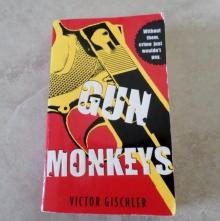 Gun Monkeys
Gun Monkeys Go-Go Girls of the Apocalypse
Go-Go Girls of the Apocalypse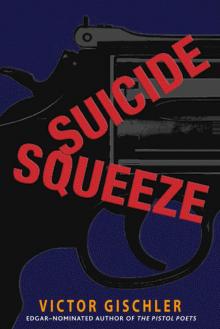 Suicide Squeeze
Suicide Squeeze The Pistol Poets
The Pistol Poets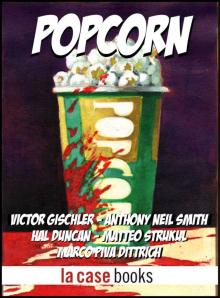 POPCORN
POPCORN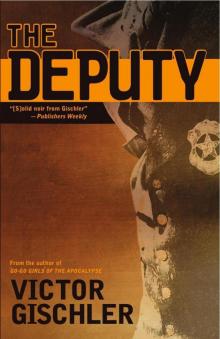 The Deputy
The Deputy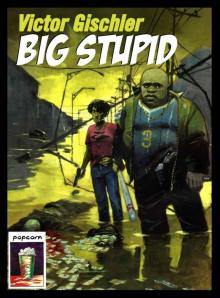 Big Stupid (POPCORN)
Big Stupid (POPCORN) Pistol Poets
Pistol Poets Shotgun Opera
Shotgun Opera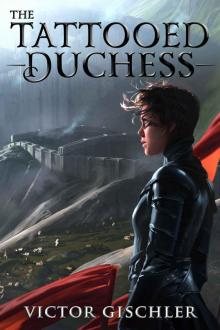 The Tattooed Duchess (A Fire Beneath the Skin Book 2)
The Tattooed Duchess (A Fire Beneath the Skin Book 2) Ink Mage
Ink Mage Go-Go Girls of the Apocalypse: A Novel
Go-Go Girls of the Apocalypse: A Novel Stay
Stay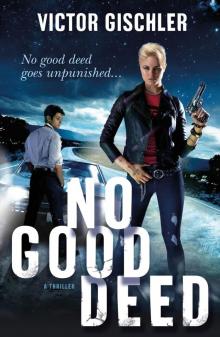 No Good Deed
No Good Deed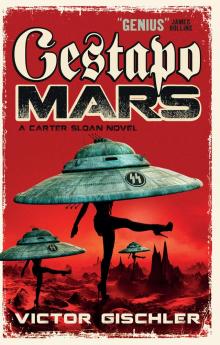 Gestapo Mars
Gestapo Mars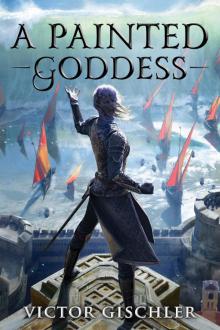 A Painted Goddess
A Painted Goddess